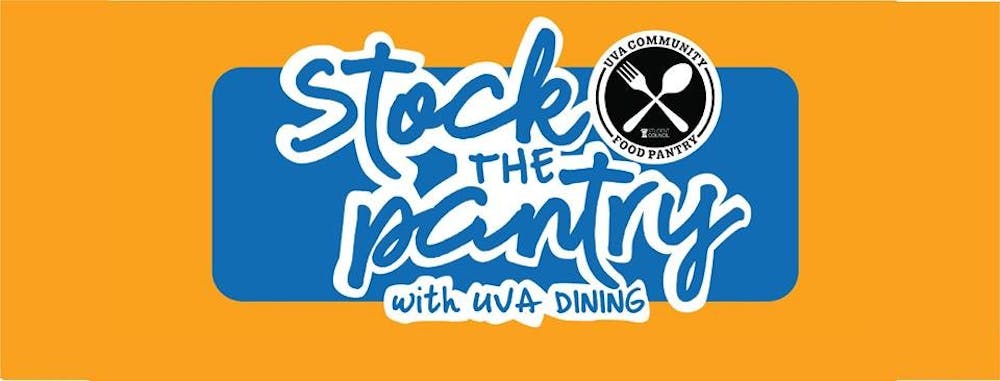
The U.Va. Community Food Pantry partnered with U.Va. Dining Sept. 25 to raise 800 pounds of food through its “Stock the Pantry” event. At Newcomb Dining Hall, students had the option to donate a meal swipe to secure one pound of food for the pantry — a student-run volunteer initiative, started by former College student Gwen Dilworth, that seeks to alleviate food insecurity on Grounds.
Overall, 400 students chose to exchange a swipe for a pound of food, and UVA Dining matched that number. During lunch hours, one meal swipe is equivalent to $11.
The Community Food Pantry, which is located in the Runk Green Room, opened Oct. 2018. To keep their shelves stocked, the pantry conducts various food drives around Grounds and utilizes a grant of $6,192 from the U.Va. Parents Fund.
Mairin Shea, a fourth-year Batten student and executive director of the U.Va. Community Food Pantry, said the pantry partnered with U.Va. Dining in 2018 for a Stock the Pantry drive prior to to the pantry’s launch.
According to Laura Renigar, marketing manager for Aramark, U.Va. Dining donated close to 1,000 pounds of food to the U.Va. Community Food Pantry last fall.
“One pound of food is roughly a jar of peanut butter, can of soup or beans, or eight boxes of macaroni,” Renigar said. “A typical donation includes canned soups, beans, vegetables, tuna, fruit, snacks and other packaged items.”
Shea noted that pantry use has picked up since it opened its doors in 2018 — during the spring 2019 semester, the pantry disbursed 681 pounds of food. The pantry is open to undergraduate and graduate students as well as University staff, and Shea estimates the pantry serves a roughly even ratio of students to staff.
“When people come into the pantry, they can take however much they need, there's no limitations or anything,” Shea said. “They just come, we weigh the food and then they can go.”
Right now, students and staff can access the pantry in the Runk Green Room — a multipurpose room available to other student groups — but next semester, Shea said the pantry will relocate to what is now the Student Activities Center Kitchen, located in Newcomb Hall.
“Right now we have to share the space with other groups who reserve it, so our pantry is mobile, it's on wheels,” Shea said. “We pack it up every time we open and close the pantry.”
Ellie Dilworth, second-year College student and communications coordinator for the Community Food Pantry, explained that the pantry doesn’t present itself as a solution — it’s just there to alleviate the stress that accompanies food insecurity.
Although there is no specific data on food insecurity at the University, a study from the Wisconsin HOPE Lab at the University of Wisconsin — an organization that has conducted extensive research on food insecurity on college campuses — reports 36 percent of university students report experiencing food insecurity.
“I think a lot of people think that on college campuses, [food insecurity] is not a thing,” Dilworth said. “You have meal plans, unlimited swipes or whatever, but I think [food insecurity] really is a thing that is very real.”
